![]() The media of Central Asia,
who informed about last week’s armed clashes
and cross-border violence between
Kyrgyzstan and Tajikistan must
use peace journalism tools, according to the message
of the School of Peacemaking and Media
Technology in Central Asia.
The media of Central Asia,
who informed about last week’s armed clashes
and cross-border violence between
Kyrgyzstan and Tajikistan must
use peace journalism tools, according to the message
of the School of Peacemaking and Media
Technology in Central Asia.
Analysis of the media space showed that the armed clashes narratives dominated in daily news.
The audience received information on battles, victims, violence and military actions.
However, the media content was more war-oriented.
The media outlets published no materials focused on decisions offering and analysing various options of peaceful initiatives.
The School of Peacemaking encourages journalists and content creators to use peace journalism approaches. This approach helps editors and reporters to choose what and how to report on the events to consider non-violent response to the conflict.
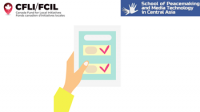 The School of Peacemaking and Media Technology in Central Asia is
announcing the call for participation in the "Reporting on minority and
marginalised groups issues’ workshop” to be held in late October thru early
November 2022 in Bishkek.
The School of Peacemaking and Media Technology in Central Asia is
announcing the call for participation in the "Reporting on minority and
marginalised groups issues’ workshop” to be held in late October thru early
November 2022 in Bishkek.
The working languages of the event are Russian, Kyrgyz.
Journalists and editors from Kyrgyzstan are invited to participate in the training. All costs will be covered by organisers.
To take part in the call, you have to submit a filled application form, a CV of a potential participant, a scanned copy of a passport, as well as a motivation letter for participation to the e-mail peacemakingandmediaca@gmail.com marked as "For training”.
The main criteria of selection will be their current activities in the sphere, understanding of importance of human rights and promotion of minority and vulnerable group issues in the media.
The deadline for applications is 5.00 pm Bishkek time, October 5, 2022.
Applications submitted after the deadline will not be considered. The team does not comment its selection methods and does not reply to requests after the competition is over.
The event will be held under the Peacemaking School’s programme on the promotion of media freedom and diversity, supported by the Canada Fund for Local Initiatives (CFLI).
 The Coalition for Equality, which brings together 36 civil society organizations and activists in Kyrgyzstan, has addressed the president of Kyrgyzstan and the government with an appeal to provide information about the difficult international situation.
The Coalition for Equality, which brings together 36 civil society organizations and activists in Kyrgyzstan, has addressed the president of Kyrgyzstan and the government with an appeal to provide information about the difficult international situation.
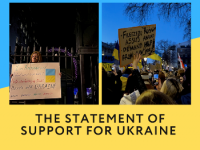 Justice for Journalists Foundation
(JFJ)andthe undersigned organisations, stand in solidarity with the
people of Ukraine, but particularly Ukrainian journalists who now find
themselves at the frontlines of a large-scale European war.
Justice for Journalists Foundation
(JFJ)andthe undersigned organisations, stand in solidarity with the
people of Ukraine, but particularly Ukrainian journalists who now find
themselves at the frontlines of a large-scale European war.
We unilaterally condemn the violence and aggression that puts thousands of our colleagues all over Ukraine in grave danger.
We call on the international community to provide any possible assistance to those who are taking on the brave role of reporting from the war zone that is now Ukraine.
We condemn the physical violence, the cyberattacks, disinformation and all other weapons employed by the aggressor against the free and democratic Ukrainian press.
We also stand in solidarity with independent Russian media who continue to report the truth in unprecedented conditions.
Join the statement of support for Ukraine by signing it here.
#Журналісти_Важливі
Signed:
1. Justice for Journalists Foundation
2. Index on Censorship
3. International Foundation for Protection of Freedom of Speech "Adil Soz”
4. International Media Support (IMS)
5. Yerevan Press Club
6. Turkmen.news
7. Free Press Unlimited
8. Human Rights Center "Viasna”
9. Albanian Helsinki Committee
10. Media Rights Group, Azerbaijan
11. European Centre for Press and Media Freedom
12. Association of European Journalists
13. School of Peacemaking and Media Technology in Central Asia
14. Human Rights Center of Azerbaijan
15. Reporters Without Borders, RSF
16. Association of Independent Press of Moldova, API
17. Public Association "Dignity”, Kazakhstan
18. PEN International
19. Human Rights House Foundation, Norway
20. IFEX
21. UNITED for Intercultural Action
22. Human Rights House Yerevan
23. Helsinki Citizens’ Assembly – Vanadzor, Armenia ??
24. Rafto Foundation for Human Rights, Norway
25. Society of Journalists, Warsaw
26. The Swedish OSCE-network
27. Hungarian Helsinki Committee
28. Legal policy research centre, Kazakhstan
29. Public Foundation Notabene – Tajikistan
30. HR NGO "Citizens’ Watch – St. Petersburg, Russia
31. English PEN
32. Public organization "Dawn” – Tajikistan
33. International Press Institute (IPI)
34. The Union of Journalists of Kazakhstan
35. ARTICLE 19
36. Human Rights House Tbilisi
37. Rights Georgia
38. Election Monitoring and Democracy Studies Center. Azerbaijan
39. International Service for Human Rights (ISHR)
40. Bulgarian Helsinki Committee
41. Global Forum for Media Development (GFMD)
42. European Federation of Journalists
43. Social Media Development Center, Georgia
44. Populus Rei, Georgia
45. OBC Transeuropa
46. The Bureau of Investigative Journalism
47. Journalists Union YENI NESIL, Azerbaijan
48. Media and Law Studies Association (MLSA) , Istanbul
49. Baku Press Club
50. Centre for Journalism Innovation and Development Premium Times
51. Union Sapari
52. The Coalition For Women In Journalism (CFWIJ)
53. Committee to Protect Freedom of Expression, Armenia
54. FEDERATIA SINDICATELOR DIN SOCIETATEA ROMANA DE RADIODIFUZIUNE, Bucharest, ROMANIA
55. CD FILMS (FRANCE)
56. CFDT-Journalistes
57. Belarusian Association of Journalists
58. SafeJournalists network
59. Association of Journalists of Kosovo
60. Association of Journalists of Macedonia
61. BH Journalists Association
62. Croatian Journalists’ Association
63. Independent Journalists Association of Serbia
64. Trade Union of Media of Montenegro
65. Analytical Center for Central Asia (ACCA)
66. Trade Union of Croatian Journalists
67. European Press Prize
68. Ethical Journalism Network
69. European Journalism Centre
70. Slovene Association of Journalists
71. Investigative Studios
72. PEN Belarus
73. Public Media Alliance (PMA)
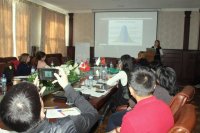 Activists
working in NGOs on the issues of diversity, minorities and social groups from
various regions of Kyrgyzstan trained effective communications with media at the workshop held in Bishkek on November 23, 2017.
Activists
working in NGOs on the issues of diversity, minorities and social groups from
various regions of Kyrgyzstan trained effective communications with media at the workshop held in Bishkek on November 23, 2017.
The training program comprised interactive sessions and practical group exercises. Participants learned about the purposes of communications and newsbreaks, learned how to make standard events interesting for media, understood to find topics that may be of interest for the audience when covering the activities of NGOs in the context of minorities issues.
A special session was dedicated to the freedom of expression, hate speech and stereotypes, and also the skills of compiling glossaries on overcoming hate speech to work with sensitive content. During intensive group games, participants practiced the skills of communicating with journalists, and learned to hold press conferences given the model situation.
Natalya Lyubeznova, a trainer of the workshop, says that effective communications between media and communities will help activists promote significant ideas and projects important for the people.
"Acquiring the interaction skills is needed to establish contacts and relations, to understand the choice of ways of community target achievement, including through the formation of a favorable attitude, which will neutralize the public negative attitude, which was shaped due to various legal initiatives focused on the reduction of civil sector activities,” Lyubeznova emphasized.
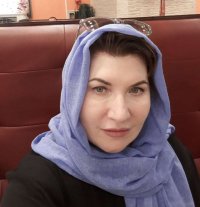 By mid-August, Taliban militants seized much of Afghanistan; on August 15, they took control of Kabul without a fight. President Ashraf Ghani fled the country; the Taliban try to establish their rule and intend to transform Afghanistan into Islamic Emirate. Meanwhile, the rest of the world is rethinking what happened: countries are deciding how to build foreign policy relations with new Afghanistan, as well as what to do with the refugees, who, presumably, will flee the country.
By mid-August, Taliban militants seized much of Afghanistan; on August 15, they took control of Kabul without a fight. President Ashraf Ghani fled the country; the Taliban try to establish their rule and intend to transform Afghanistan into Islamic Emirate. Meanwhile, the rest of the world is rethinking what happened: countries are deciding how to build foreign policy relations with new Afghanistan, as well as what to do with the refugees, who, presumably, will flee the country.
Inga Siukorskaia,Director of the School of Peacemaking and Media Technology in Central Asia Inga Sikorskaya spoke with CABAR.asia Media School about how Central Asian media should cover the situation in order not to increase xenophobia in society towards refugees, and much more.
– How should the journalists report on refugees?
– According to the standards of covering diversity issues, which include such social groups as "refugees” (people who already have this status), "asylum-seekers” and "forced migrants” (those forced to move to a certain country out of fear for their lives and seeking refugee status), the journalist must first analyse how media covered this issue before and identify the gaps.
Often, the media report on such people only in crime news, or in a humiliating context, thereby instilling fear among the audience. A reporter should follow a peacemaking approach: spend a few days in a refugee camp with these people, describe what you saw, how they live, whether they have access to water, their children – to education, healthcare. Let them tell the story in their words. Find people among them who were able to reintegrate into society, and tell about them. Do not forget about ethical terminology and visual content.
During my recent trip to Afghanistan, I spoke a lot with colleagues and ordinary people and I think that in fact, no one intends to flee to Kyrgyzstan, for example. First, you will be surprised, but the Afghan people are the patriots of their country. They can bear the poverty, but the main thing for them – to stay at their homes. Second, those who want to leave Afghanistan after the Taliban takeover do not intend to go to the Central Asian countries at all; they want to go to the United States, to Europe.
– Nevertheless, our authorities have already announced they are going to accept Afghans fleeing the Taliban regime.
– Yes, they announced the intention to accept 1.2 thousand people, but it is not a sure thing that it will be Afghans. It is quite possible that they meant ethnic Kyrgyz people from Badakhshan, who were previously not allowed across the Tajik border. In addition, we must understand that Afghans have already learned the difficult lesson in Kyrgyzstan: some people, who applied for asylum, lived here for 25 years, and left or died, without receiving refugee status.
– In addition, people are afraid not so much of those fleeing the Taliban, as of the Taliban themselves, who will now go to the Central Asian countries, as some experts claim.
– The Taliban have nothing to do here either. What happened in Afghanistan is the internal political processes and the geopolitical struggle for influence in the region, which various experts and politicians used in their mainstream forecasts to spread panic.
– It turns out that journalists help such politicians.
– To some extent. Even today, sensationalised media are contributing to the creation of a negative stereotype not only about refugees, who, by the way, did not appear yet, but also about any foreigners arriving in the country. They maintain and develop a prejudice against people dressed differently, or speaking different languages.
– How does this happen?
– Our society, unfortunately, has many negative stereotypes about Afghanistan. What are the media doing against the background of general hysteria and panic? They post tweets of unknown people without even checking the facts. Authoritative media quote users who post something like, "I went out for a cappuccino, and there were millions of Pakistanis around”.
– What is wrong with this tweet?
– The problem is not the tweet, but the fact that the media reposted it. The phrase "millions of Pakistanis” is exaggerating data. By publishing it, the media commits a gross journalistic error, relaying an outrageous stereotypical perception. It can be reposted, but, according to the journalistic standards and a peacemaking approach, it is necessary to place the facts in the appropriate context. This will remove the problem and enable the audience to understand what is happening in reality. Given the complex political environment, the context should be broad, neutral, not inciting hatred or fear.
Moreover, this is not the only example. You probably noticed the materials about Bishkek residents complaining about the alleged influx of foreigners to the capital of Kyrgyzstan. These messages are also based on user-generated content. Moreover, the media not only cite online users but also use their photos. The photos of people in unusual for Kyrgyz people clothes, possibly Pakistani or Indian students, are being reposted. These clothes are called Pashtun, although it is wrong. Therefore, by creating such messages, the journalists trigger certain groups of people and this, as a result, can lead to hate crimes.
– Would it be right to create a material explaining how Pashtun clothes differ from other national clothes?
– What for? People should not be judged by what they wear. This is unacceptable for the media. Focusing on differences in a particular socio-political context leads to intolerance and hostility. Social media users do this because they are incompetent and lack a degree of journalistic responsibility. But why do the journalists allow this? This is an intolerant approach. A person can wear any clothes, if, of course, we are not talking about some kind of dress codes in official institutions; he/she can speak the most comfortable language. In case the media want to show that there really are some rumors about an alleged influx of refugees, they should conduct an investigation using the tools of Peace Journalism: to talk to these people, understand who they are, and provide the audience with a big picture.
– The media tried to clarify the situation: they published the answers of the border service on how many foreigners had arrived in Kyrgyzstan.
– What was the point of finding this out? The foreigners are always a targeted group in such countries as Kyrgyzstan, where there is a problem with tolerance. In this situation, all of a sudden, the media asked the border guards for information about the number of foreigners who arrived in the country (from Iran, Afghanistan, Pakistan, etc.). Why, in the current disturbing socio-political context, cover this topic in one-sided news? They should provide balanced news, and should not create fear. In addition, is Kyrgyzstan not positioning itself as a tourist destination? We should welcome any foreigners if so.
– What approach should be followed when covering refugees-related issues?
– Now, the main thing is to accurately verify the information and try to balance it. In peacemaking journalism, reporting should focus on peace rather than conflict. In Peace Journalism, there is a rule of "Three Don’ts”:
This approach enables editors and reporters to make choices, that is, decide what facts and in what context to communicate to the audience for the consideration of non-violent responses to the conflict. The conflict here means not only a military conflict but also any situation that can become a source of potential conflicts in society.
– What should journalists remember when covering refugees-related issues?
– Before creating a negative image of people who may possibly arrive from the conflict zone, which I deeply doubt, we need to understand that each of us could find him/herself in their place. Now, I updated all my training materials for journalists and included there the practice of own feelings and understanding that the world is dynamic and unstable. No one can know what will happen tomorrow. The population of any country can be involved in a military conflict. That is, any of us can become a refugee and forced migrant in another country. Because of the appearance, language, cultural differences (which do not comply with some stereotypes in society), with the "support” of unethical, incompetent journalists, any person can be attributed to a target group hated by others.
Title photo: AFP / Scanpix / LETA
This publication was produced as part of the mentorship programme under the Development of New Media and Digital Journalism in Central Asia project delivered by the Institute for War and Peace Reporting (IWPR) with support from the UK Government. It does not necessarily reflect the official views of IWPR or the UK Government
 The School of
Peacemaking and Media Technology in Central Asia announces an annual
competition among students from Kyrgyzstan and Kazakhstan and any countries,
studying journalism and mass communication, law, cultural studies, and
anthropology, to participate in research and media monitoring projects.
The School of
Peacemaking and Media Technology in Central Asia announces an annual
competition among students from Kyrgyzstan and Kazakhstan and any countries,
studying journalism and mass communication, law, cultural studies, and
anthropology, to participate in research and media monitoring projects.
Over the past five years, more than 50 students have completed research internships.
This internship is scheduled for the period from December 15 to January 20, 2022.
In some cases, a student can start an internship earlier.
Due to the epidemiological situation, it is likely that an internship will be carried out in a distance format.
The selected interns will be trained in new analytical tools, will have access to databases, and together with the team, will conduct a few studies.
Participation in the project is a good practice, upon completion of which an internship confirmation letter will be issued. An important criterion for selecting interns is language proficiency, perseverance, attentiveness, a clear application of methodology and indicators in practice, a desire to work with large amounts of information.
Participation in the project is a good practice, upon completion of which an internship confirmation letter will be issued. An important criterion for selecting interns is language proficiency, perseverance, attentiveness, the use of methodology and indicators during research, a desire to work with large amounts of information on the Internet.
Topics for this year:
COVID-19 pandemic and information manipulation
Electoral processes
Xenophobia and hate speech
Terrorism Threats and Media Narratives
A letter of motivation and a CV indicating the contacts of at least two referees should be sent to peacemakingandmediaca@gmail.com until 18:00 Bishkek time, December 5, 2021, marked "For internship".
Applications sent after this deadline will not be considered. The team does not comment on the selection methods and does not respond to letters of inquiry after the end of the call.
The School of Peacemaking and Media Technology in Central Asia announces an annual a competition among students from Kyrgyzstan and Kazakhstan and any countries, studying journalism and mass communication, law, cultural studies and anthropology, to participate in research and media monitoring projects.
Over the past five years, more than 50 students have completed the research internships.
This internship is scheduled for the period from December 15 to January 20, 2022.
In some cases, a student can start an internship earlier.
Due to the epidemiological situation, it is likely that an internship will be carried out in a distance format.
The selected interns will be trained in new analytical tools, will have access to databases and, together with the team, will conduct a few of studies.
Participation in the project is a good practice, upon completion of which an internship confirmation letter will be issued. An important criterion for selecting interns is language proficiency, perseverance, attentiveness, a clear application of methodology and indicators in practice, a desire to work with large amounts of information.
Participation in the project is a good practice, upon completion of which an internship confirmation letter will be issued. An important criterion for selecting interns is language proficiency, perseverance, attentiveness, the use of methodology and indicators during research, a desire to work with large amounts of information on the Internet.
Topics for this year:
COVID-19 pandemic and information manipulation
Electoral processes
Xenophobia and hate speech
Terrorism Threats and Media Narratives
A letter of motivation and a CV indicating the contacts of at least two referees should be sent to peacemakingandmediaca@gmail.comuntil 18:00 Bishkek time, December 5, 2021 marked "For internship".
Applications sent after this deadline will not be considered. The team does not comment on the selection methods and does not respond to letters of inquiry after the end of the call.
The report shows the results of monitoring, documenting and case analysis related to discrimination and violence during the coronavirus pandemic, as well as the study of hate speech against minorities and vulnerable groups in the selected online content.
The report contains the data that cover the period from February 15, 2020 thru March 10, 2021.
The study represents the analysis of cases relating to eleven vulnerable social groups:
· female victims of violence and abduction;
· persons with disabilities, including inmates;
· internal migrants;
· labour migrants;
· the elderly people;
· people living with HIV;
· LGBT people;
· children under 15;
· foreigners victims of racial attacks;
· Muslims;
· ethnic Chinese
In addition, the report contains a separate subsection with the case of Kamil Ruziev, the human rights defender based in Karakol, Issyk Kul region. He was arrested in May 2020 on a reasoned charge and was morally coerced, surveilled and illegally questioned even though he was ill with COVID-19.
 The media should help
the society better know the online environment. It is important to detect the
reliable sources, differentiate between quality information, facts and fakes,
carry out unbiased journalistic investigations amid the existing hate speech,
trolling and disinformation.
The media should help
the society better know the online environment. It is important to detect the
reliable sources, differentiate between quality information, facts and fakes,
carry out unbiased journalistic investigations amid the existing hate speech,
trolling and disinformation.
The School of Peacemaking and Media Technology in CA with the support of the Media K Internews (Kyrgyzstan) documents cases of verbal aggression in the online environment as part of the ongoing monitoring and analysis of hate speech.
The hate speech dynamics in public space demonstrates that it remains at a high level.
The results gathered as of the World Press Freedom Day showed that almost one-third part of the monitored content contained hate speech in various forms. It was especially noticeable in online discussions about the referendum on amendments to the constitution of the Kyrgyz Republic, local and extraordinary presidential election that was held in 2021[1].
The outbreak of intolerance and distorted information was found in the last days of April 2021 amid messages about the armed conflict in the Kyrgyzstan-Tajikistan border.
The intense public and political agenda of Kyrgyzstan aggravated by the crisis during the COVID-pandemic encourages the journalists and internet users to voice their opinions more actively. However, it is often accompanied by fake news, unverified information and deliberate misrepresentation of information.
Amid this situation, the experts reported correlations between hate speech, trolling and not always reliable messages that are spread in social media both by identified and fake accounts. Endless data flows, verbal aggression, disinformation make the audience doubt whether information is reliable. Therefore, journalistic investigations about facts, scope of distribution of such information, its actors and purposes are highly required.
The media should play the key role by using new approaches of creating and distributing content to protect and promote truthful information, by encouraging the audience to improve their media literacy skills and to offer opportunities, to evaluate information critically.
The World Press Freedom Day means to raise awareness of governments and the society on the need to respect and protect human rights to the freedom of expression, and to highlight the importance of complying with high standards and ethics for journalists, internet content creators. It will help improve the information ecology and create long-term measures to respond to hate speech and fake news.
[1]Hate speech on the internet during early presidential election in Kyrgyzstan, January 2021, http://ca-mediators.net/ru/ru_news/5396-yazyk-vrazhdy-i-sarkazm-v-internete-v-period-dosrochnyh-prezidentskih-vyborov-v-kr.html

The School of Peacemaking and Media Technology in Central Asia announces an annual competition among students from Kyrgyzstan, Kazakhstan,…
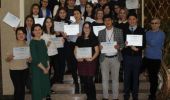
25 journalists and media workers from various regions of Kyrgyzstan have been trained to counter the propaganda of violent extremism and hate in…